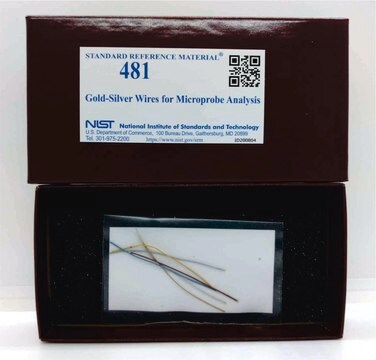349283
Gold
wire, diam. 0.1 mm, 99.99% trace metals basis
Sinónimos:
Gold Powder, Gold black, Gold element
Iniciar sesiónpara Ver la Fijación de precios por contrato y de la organización
About This Item
Fórmula empírica (notación de Hill):
Au
Número de CAS:
Peso molecular:
196.97
EC Number:
MDL number:
UNSPSC Code:
12141717
PubChem Substance ID:
NACRES:
NA.23
Productos recomendados
assay
99.99% trace metals basis
form
wire
resistivity
2.05 μΩ-cm, 0°C
diam.
0.1 mm
bp
2808 °C (lit.)
mp
1063 °C (lit.)
density
19.3 g/mL at 25 °C (lit.)
SMILES string
[Au]
InChI
1S/Au
InChI key
PCHJSUWPFVWCPO-UHFFFAOYSA-N
Categorías relacionadas
Application
Gold wires can be used for a variety of applications such as a probe for tip enhanced near-field optical microscopy (TENOM) which can further be used in the detection of fluorescence or Raman emission and as a probe that facilitates the electrical conductivity of the metallic composites.
Quantity
150 mg = 1 m; 750 mg = 5 m
Storage Class
11 - Combustible Solids
wgk_germany
nwg
flash_point_f
Not applicable
flash_point_c
Not applicable
ppe
Eyeshields, Gloves, type N95 (US)
Elija entre una de las versiones más recientes:
¿Ya tiene este producto?
Encuentre la documentación para los productos que ha comprado recientemente en la Biblioteca de documentos.
Los clientes también vieron
Stretchable gold conductors on elastomeric substrates
Lacour S, et al.
Applied Physics Letters, 82(15), 2404-2406 (2003)
Apertureless near-field/far-field CW two-photon microscope for biological and material imaging and spectroscopic applications
Nowak DB, et al.
Applied Optics, 49(35), 6766-6771 (2010)
Enhanced image contrast with delocalized near-field excitation
Sanchez E, et al.
Crystal Research and Technology, 49(9), 681-689 (2014)
Tianxun Gong et al.
Journal of biomedical nanotechnology, 9(6), 985-991 (2013-07-19)
In this paper, we proposed the use of gold nanoparticles as plasmon scattering probes for dark-field multiplex imaging of live cancer cells. By carefully engineering the surfaces, aqueous dispersions of anti-EGFR antibody-conjugated gold nanospheres and gold nanorods are prepared. We
Tae-Sik Cho et al.
Journal of nanoscience and nanotechnology, 13(5), 3711-3714 (2013-07-19)
The crystallization of Au/glass ultrathin films for surface plasmon resonance (SPR) biosensor has been studied using synchrotron X-ray scattering and field emission scanning electron microscope. In films thinner than 30 nm, crystallized Au grains with [111] preferred orientation were formed
Nuestro equipo de científicos tiene experiencia en todas las áreas de investigación: Ciencias de la vida, Ciencia de los materiales, Síntesis química, Cromatografía, Analítica y muchas otras.
Póngase en contacto con el Servicio técnico

